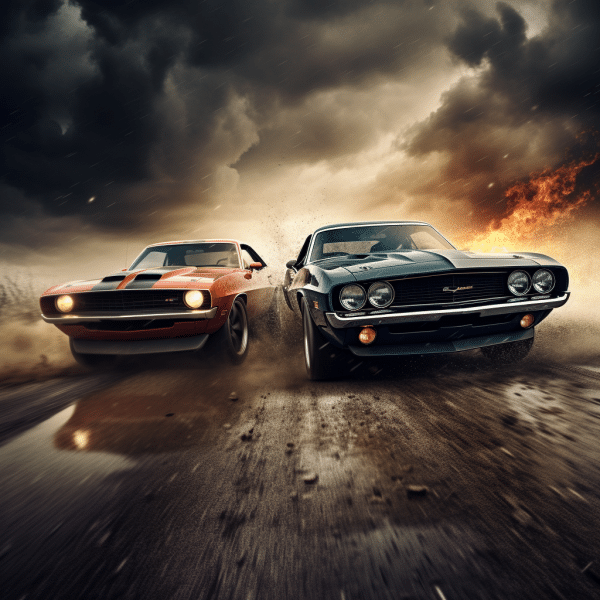
Unveiling the Thrills: Sports Cars vs. Muscle Cars
Introduction to Sports Cars and Muscle Cars
Sports Cars vs. Muscle Cars are agile, sleek cheetahs; whereas muscle cars are hulking gorillas. Both boast speed and power, but one looks far cooler!
When picking one, consider your needs and preferences. If you love speed and nimble handling, a sports car is ideal. If raw power and a bold presence is more your style, go for a muscle car.
Also think about budget and costs. Sports cars are pricier upfront and for ongoing expenses, but offer better fuel efficiency. Muscle cars are cheaper, but have higher fuel consumption. So, decide wisely.
Key Differences between Sports Cars and Muscle Cars
Sports cars and muscle cars may be alike, but they differ in key ways. Let’s explore!
Let’s make it simple with this table:
| Sports Cars | Muscle Cars |
|---|---|
| Light & agile | Heavy & powerful |
| Designed for speed | Built for strength |
| Sleek shapes | Classic American styling |
| 2/4-seaters | Often larger seating capacity |
| High-performance engines | High-displacement engines |
Now for the details. Sports cars are all about lightness and nimbleness. Drivers who love speed and taking corners quickly love them. Muscle cars are all about power. With heavy frames and high-displacement engines, they can really accelerate fast on straight roads.
Sports cars come in sleek aerodynamic shapes to maximize performance. Muscle cars have classic American styling that looks powerful. Sports cars usually seat two or four. Muscle cars often have larger seating capacity.
Finally, an interesting fact. The term “muscle car” was coined in the 1960s. Muscle cars had high-performance engines for lots of horsepower. Sports cars have been around since the early 20th century.
It’s time to compare sports cars and muscle cars!
Performance Comparison between Sports Cars and Muscle Cars
Sports cars and muscle cars differ in performance. Sports cars are known for agility and handling, while muscle cars have power and acceleration. Let’s compare some metrics.
Sports cars have higher top speeds due to their aerodynamic designs. But, muscle cars have more acceleration from a standstill. The braking distance is shorter for sports cars, but muscle cars need more due to their heavy build. Handling is better with sports cars due to the weight distribution. Muscle cars, though, provide a raw driving experience with rear-wheel-drive setups.
Before deciding, remember that each type has its own charm. It’s all about personal preference. Sports cars are like sleek fashion models, muscle cars are like heavyweight wrestlers in speedos!
Design and Aesthetics of Sports Cars and Muscle Cars
Sports cars and muscle cars have different design aspects. Exterior-wise, sports cars have a sleek and aerodynamic shape, while muscle cars have an aggressive look emphasizing power. Interiors differ too; sports cars are driver-centric with minimalistic designs, whereas muscle cars have retro-inspired, spacious interiors.
Sports cars have a futuristic and sophisticated look with bold lines and features like scissor doors. Whereas, muscle cars show off a nostalgic vibe and iconic grill designs. The customization aspect is also unique; enthusiasts can personalize their car with spoilers, body kits, or paint jobs.
For those considering buying either type, performance upgrades like exhaust systems or suspension enhancements can make sports cars even more thrilling. Muscle car lovers can add aftermarket accessories like oversized wheels or racing stripes to amp up its presence on the road. Ultimately, sports cars offer speed and practicality, while muscle cars prove that sometimes being impractical is practical.
Practicality and Everyday Usability of Sports Cars and Muscle Cars
Sports cars and muscle cars have different features. Sports cars are less spacious, usually two-seater or 2+2, have lower ground clearance, and possess a sleek, aerodynamic design. Meanwhile, muscle cars offer more space, are four-seater, have higher ground clearance, and have a bold and muscular design. Additionally, sports cars typically have smaller trunks for storage and less fuel-efficiency. On the other hand, muscle cars may sacrifice some agility for a more comfortable ride.
Sports cars are typically associated with luxury brands like Porsche and Ferrari. Muscle cars, however, have an American heritage. Brands like Ford Mustang and Chevrolet Camaro have become iconic.
The decision between these cars depends on personal preference. If one prefers nimble handling and sleek design, they should go for the sports car. For raw power and classic American look, the muscle car is the better choice. Car and Driver states that sports cars are better at performance on winding roads and muscle cars excel in straight-line acceleration.
No matter what, sports cars and muscle cars have one thing in common – they make minivans cry themselves to sleep at night!
Popularity and Cultural Significance of Sports Cars and Muscle Cars
Sports Cars and Muscle Cars have a unique popularity and cultural significance. They’ve captivated enthusiasts and the mainstream. To find out why, let us explore their features and historical meaning.
Sports Cars have sleek designs and high-performance engines. They’re made for fast acceleration and precise handling. And they have luxurious interiors.
Muscle Cars have powerful V8 engines. Plus, aggressive body styles. They offer straight-line acceleration and a mainstream appeal.
Sports and Muscle Cars are symbols of freedom, adventure, luxury, and rebellion. They often appear in movies and music videos, representing speed, style, and daredevilry.
The origin of Sports Cars is in Europe during the 20th century. Manufacturers like Porsche and Ferrari made cars for racing. And today, they’re sleek and powerful.
Muscle Cars started in the US in the mid-20th century. People wanted affordable, high-performance cars. The big three automakers – Ford, GM, and Chrysler – made popular models like the Mustang, Camaro, and Challenger.
It’s clear that Sports Cars and Muscle Cars have a huge impact on culture. They have an enduring allure. Whether you like brains or brawn on the road, these vehicles have it all.

Conclusion: Choosing between a Sports Car and a Muscle Car
When it comes to picking between a sports car and muscle car, there are a few things to consider. Here are five key points:
- Performance: Both offer great performance. Sports cars are speedy and agile, while muscle cars have raw power and acceleration.
- Design: Sports Cars vs. Muscle Cars have sleek, aerodynamic designs that are stylish and elegant. Muscle cars have bold, muscular exteriors that show strength.
- Handling: Sports Cars vs. Muscle Cars have precise steering and brakes that allow tight turns. Muscle cars may not be as nimble, but they make up for it with power.
- Sound: Sports cars produce high-pitched roars, and muscle cars make deep growls.
- Practicality: Consider lifestyle when choosing. Sports cars have limited space and seating, while muscle cars have more passengers and trunks.
It is essential to remember these points are just an overview. Individual preferences will influence the choice. There is an interesting history too. In the 1960s, Shelby Mustangs (American) and Porsche 911s (European) competed. This debate was about which car was the best.
In conclusion, the choice comes down to personal taste, driving preferences, and usage. Both vehicles offer unique experiences. You can pick between the agility of a sports car or the power of a muscle car. Whichever you choose, you will have an exciting journey.

